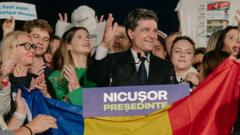Nicusor Dan, the liberal mayor of Bucharest, emerged victorious in the Romanian presidential elections, defeating nationalist candidate George Simion amidst political turbulence and public discontent. Dan's pro-European stance garnered widespread support, contrasting sharply with Simion's far-right platform.
Romanian Elections: Liberal Victory Over Nationalist Challenge

Romanian Elections: Liberal Victory Over Nationalist Challenge
Nicusor Dan captures the presidency, marking a pro-European shift against a backdrop of rising nationalism and political unrest in Romania.
In a decisive election held amidst a backdrop of political turbulence, Nicusor Dan, the liberal and pro-European mayor of Bucharest, has triumphed over right-wing nationalist candidate George Simion to secure the presidency of Romania. The election saw heightened tensions stemming from discontent with mainstream political factions, particularly following the annulment of a previous presidential race over allegations of Russian interference.
George Simion, leader of the far-right AUR party, demonstrated significant early momentum, capturing primary support through a first-round victory this month that appealed to many Romanians frustrated by the status quo. Nonetheless, Nicusor Dan ultimately achieved a resounding 53.6% of the vote, with his election reflecting a collective demand for a more progressive, EU-oriented future.
"We need to build Romania together irrespective of who you voted for," Dan remarked following his victory announcement. His winning coalition consisted of over six million voters, galvanizing a communal desire for profound change. Supporters celebrated in Bucharest, expressing relief that their choice affirmed a commitment to European integration over nationalist isolation.
While Dan's campaign emphasized anti-corruption efforts and bolstering relations with neighboring Ukraine, Simion adopted a robustly nationalist rhetoric, advocating for the reduction of EU support for Ukraine amidst further tensions with Russia. Supporters of Simion made significant gains among diaspora voters but ultimately could not overcome Dan's larger support base within Romania itself.
As counting extended well into Sunday night, Dan's victory was confirmed despite Simion initially holding out hope for a comeback, believing he still had a chance to contest the results. This suggested a split sentiment within Romanian society, as Simion claimed representation for a considerable segment of voters amid claims of electoral manipulation against him.
International reactions to the election result were swift, with leaders from Moldova and Ukraine lauding Dan’s win as a reaffirmation of shared democratic values. Furthermore, European Commission President Ursula von der Leyen acknowledged the significant turnout as a choice for an inclusive and prosperous Romania within a united Europe.
Despite Dan's emphatic win, Simion's strong showing indicates persistent nationalist sentiments that may challenge Romania’s mainstream political trajectory. As the nation grapples with its identity and future direction within Europe, the implications of this election extend beyond mere leadership, questioning the ideological schisms that define Romania today.



















